"Our goal is to show students real work at sea"
The ocean is not merely a source of resources; it is a complex, sensitive system that requires careful management and thorough study. During research internships, St Petersburg University students, who are future specialists in Earth sciences, become familiar with the modern-day challenges of ocean observation. They explore the complex, yet engaging work of oceanologists and learn to apply their knowledge in practical ways.
Professor Vyacheslav Lobanov, Head of the Physical Oceanology Laboratory at the Il’ichev Pacific Oceanological Institute of the Far Eastern Branch of the Russian Academy of Sciences, a 1977 graduate of Leningrad State University, spoke about marine research expeditions and the importance of sharing knowledge about the ocean.
Could you please describe student research internships offered by your organisation? How are these internships organised, and what does the programme include? What types of assignments are given to students? How many students participate in internship programmes annually? Which year students are eligible to enrol? What is the programme duration? Is there a specific unit within your organisation responsible for organising student internships?
Student internships at the V.I. Il’ichev Pacific Oceanological Institute of the Far Eastern Branch of the Russian Academy of Sciences (POI FEB RAS) can be conducted both in the Institute’s laboratories, where students engage in calculations and mathematical modelling, and during research marine expeditions, where they gain firsthand experience with natural ocean processes. The expeditions are conducted at the Institute’s marine experimental stations on Popov Island or Shultz Cape, as well as aboard research vessels in the coastal waters of the Peter the Great Gulf and in the seas of the Far East, in the Pacific and Arctic Oceans. Occasionally, expeditions extend to the Indian and even the Southern Oceans, essentially covering the entire World Ocean. Every year, POI FEB RAS organises 7-8 marine expeditions. These expeditions focus on various research areas, relevant to the study of the ocean’s physical characteristics, biogeochemical processes, their interannual and climatic variability, and geological, geophysical, palaeoceanographic, and acoustic studies.
Aboard research vessels, students work as members of research teams, providing measurements of physical parameters of the ocean (temperature, salinity, currents); taking water and bottom sediments samples for hydrochemical and geochemical analyses; collecting samples of plankton and other biological specimens. They learn to use oceanographic measurement methods and techniques and gain hands-on experience with modern oceanographic equipment. They analyse the data collected and learn firsthand about the challenges of studying and developing the World Ocean, including current issues in the regional oceanography of the seas of the Russian Far East.
The internship begins with the preparation for the expedition and concludes after its completion, typically lasting 1-2 months. There is no dedicated unit for organising student internships at the Institute; instead, the research laboratories that plan the expeditions handle this responsibility. Students are employed by the Institute and are paid for their work.
Could you please tell us more about St Petersburg University students who do internships with you? What are their areas of study at the University? What projects do they participate in? Could you provide examples of students’ contributions to research projects? What valuable knowledge do they acquire during their internship?
Typically, these are students studying Earth sciences, including oceanography, ecology, and geology, with fewer numbers of marine biologists. Additionally, we have interns who specialise in chemistry and physics. One of the major recent projects our interns participate in is the interdepartmental programme "Environmental Safety of Kamchatka and Adjacent Waters". This programme was initiated in response to a sudden incident of marine organisms freezing in the Avacha Bay, southern Kamchatka, in the autumn of 2020, which was caused by an outbreak of toxic algae. This phenomenon, while known to occur in the World Ocean, was unprecedented in Kamchatka on such a scale. Between 2022 and 2023, we conducted three marine expeditions aboard the research vessels "Professor Gagarinski" and "Akademik Oparin", along with several land expeditions. These expeditions aimed to study water dynamics and the hydrochemical regime of the coastal ocean zone and the Kamchatka River, assessing the impact of volcanic ash on the ratio of biogenic elements in seawater, which could affect the development of certain microalgae species. Students from the Far Eastern Federal University, the Far Eastern State Technical Fisheries University, Moscow State University, and St Petersburg University participated in these expeditions. On the last voyage, students made up more than one third of the research staff (Picture 1).
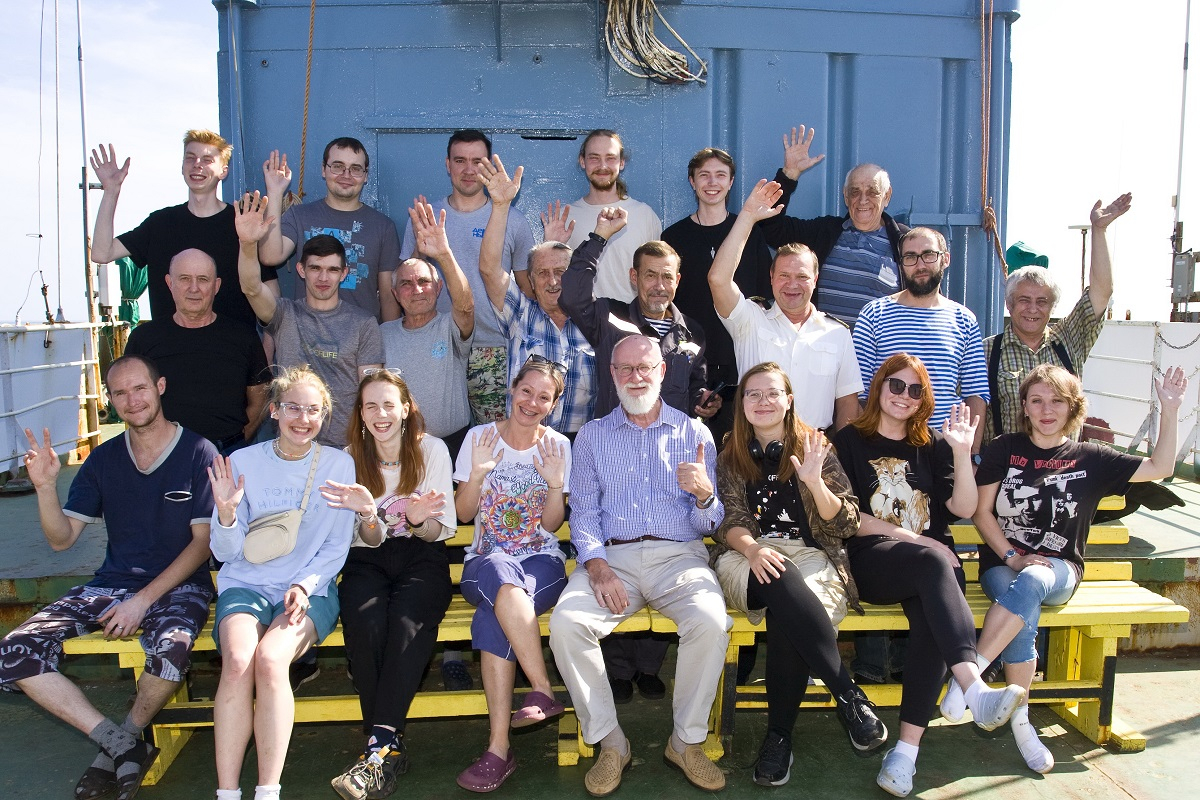
Another example is the 2024 expedition aboard the research vessel "Akademik Oparin". The expedition was part of the "Radioecological Safety of the Far Eastern Seas of Russia" programme, prompted by the discharge of contaminated water from the Fukushima Daiichi nuclear power plant. The expedition collected water samples to measure artificial and natural radionuclides in the Sea of Japan, the Sea of Okhotsk, and the Pacific Ocean waters east of Japan and the Kuril Islands. The research area spanned from the northeastern shelf of Sakhalin Island southwards, crossing the main branch of the Kuroshio Current and extending into the subtropical region. Students from the Department of Oceanology at St Petersburg University participated in that expedition (Picture 2). They operated the hydrological probe CTD to measure the electrical conductivity, temperature, and pressure of seawater and collected water samples to determine the hydrogen index (pH) and other chemical parameters. The data gathered will be used in their graduation projects to analyse the transport of water from the Fukushima Daiichi nuclear power plant and assess the fluxes of carbon dioxide between the ocean and the atmosphere, contributing to the study of climate anomaly formation mechanisms.
What is the modern-day approach to organising student internships? When running the internship programme, what is your goal: to teach future professionals how to apply their knowledge in practical settings, to help them develop and refine their skills, or perhaps to train potential future employees? Do many of your interns go on to secure employment in the Institute?
Our goal is to show students real work at sea, modern equipment, and research methods, allowing them to experience the authentic ocean environment firsthand. This hands-on exposure is crucial for students to determine if they have chosen the right career path. They have to decide whether they are genuinely interested in studying the ocean or they would prefer another field. After all, working at sea is quite challenging. There are winds and storms, sometimes uncomfortable onboard conditions, long periods away from family and friends, the comforts of home and their usual activities on the land. However, it also offers rewarding experiences such as fascinating work, the romance of distant travels, the breathtaking beauty of seas and islands, volcanoes and ice, and the camaraderie of loyal shipmates.
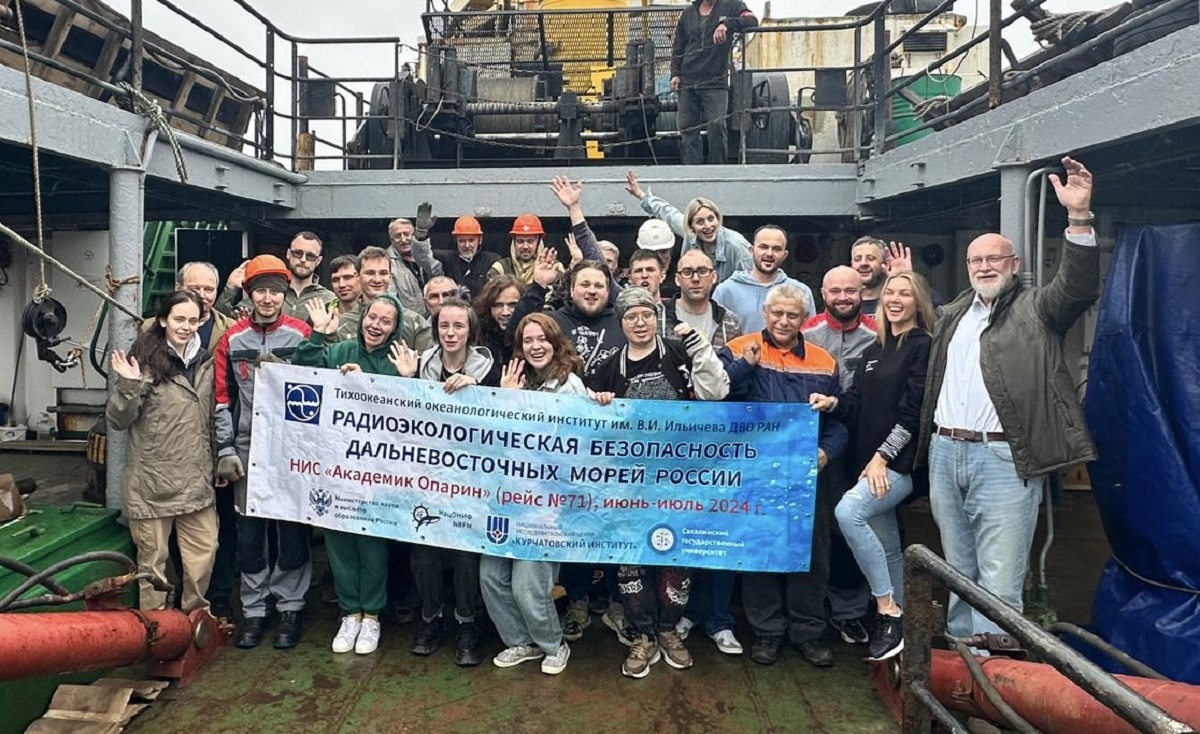
Not all interns are subsequently employed at our institute, as it is not a straightforward process. However, I know that some of those who have completed internship programmes with us are now established oceanographers, engaged in either scientific research or practical work.
Even if an intern does not pursue a career in oceanology, they will still gain valuable insights into our work, learn about current issues in ocean research and understand its importance. And there are many issues to address, indeed. Finally, people realise that the ocean is not just a source of food, a transport artery, a recreational area, or a site for military operations. Most importantly, it is the planet’s primary climate stabiliser. The ocean protects us from abrupt climate changes by redistributing heat, absorbing excess greenhouse gases, and mitigating various anomalies. However, the ocean itself is undergoing significant changes due to these impacts. It is warming, becoming more acidic, losing oxygen, experiencing sea-level changes, and becoming polluted with plastic and other harmful substances. Promoting knowledge about the ocean, its role in natural and socio-economic systems, and the necessity of studying it is particularly important now. This is especially relevant given the ongoing international initiative, the United Nations Decade of Ocean Science for Sustainable Development (2021-2030). The mission of this decade is to generate and apply new knowledge to achieve a healthy, safe, resilient, and predictable ocean for sustainable development. Our research work aligns with this goal.
Are there any graduates from St Petersburg University among your employees? If so, which departments did they study in? How would you evaluate their work?
I am a 1977 graduate of St Petersburg University, then known as Leningrad State University. I studied in the Department of Oceanology at the Faculty of Geography. Initially, there were several graduates of those years working at the Institute, but now only two remain. In recent years, we have not had any new graduates from St Petersburg University join our team. However, we do have many graduates from the Far Eastern Federal University working with us.
What qualities, in your opinion, set graduates of St Petersburg University apart from graduates of other higher education institutions?
Today, there is likely no discernible difference between graduates of universities and specialised institutes, as there was up until the 1990s, when all institutes changed their names to "university" or even "academy". Traditionally, university programmes were broader and more general, while institutes offered a more in-depth, practical focus. It was often said at the time that an institute taught students "to know everything about nothing", whereas a university taught ‘nothing about everything’. It is a joke, of course, but it effectively illustrates the distinction. For instance, young specialists graduating from the Hydrometeorological Institute were proficient in calculating oceanographic characteristics or making forecasts necessary for practical work. In contrast, university graduates were less adept at practical analysis but more focused on addressing scientific problems. Both skill sets are indeed necessary. The latter, however, is likely more important for academic organisations whose primary mission is basic research.
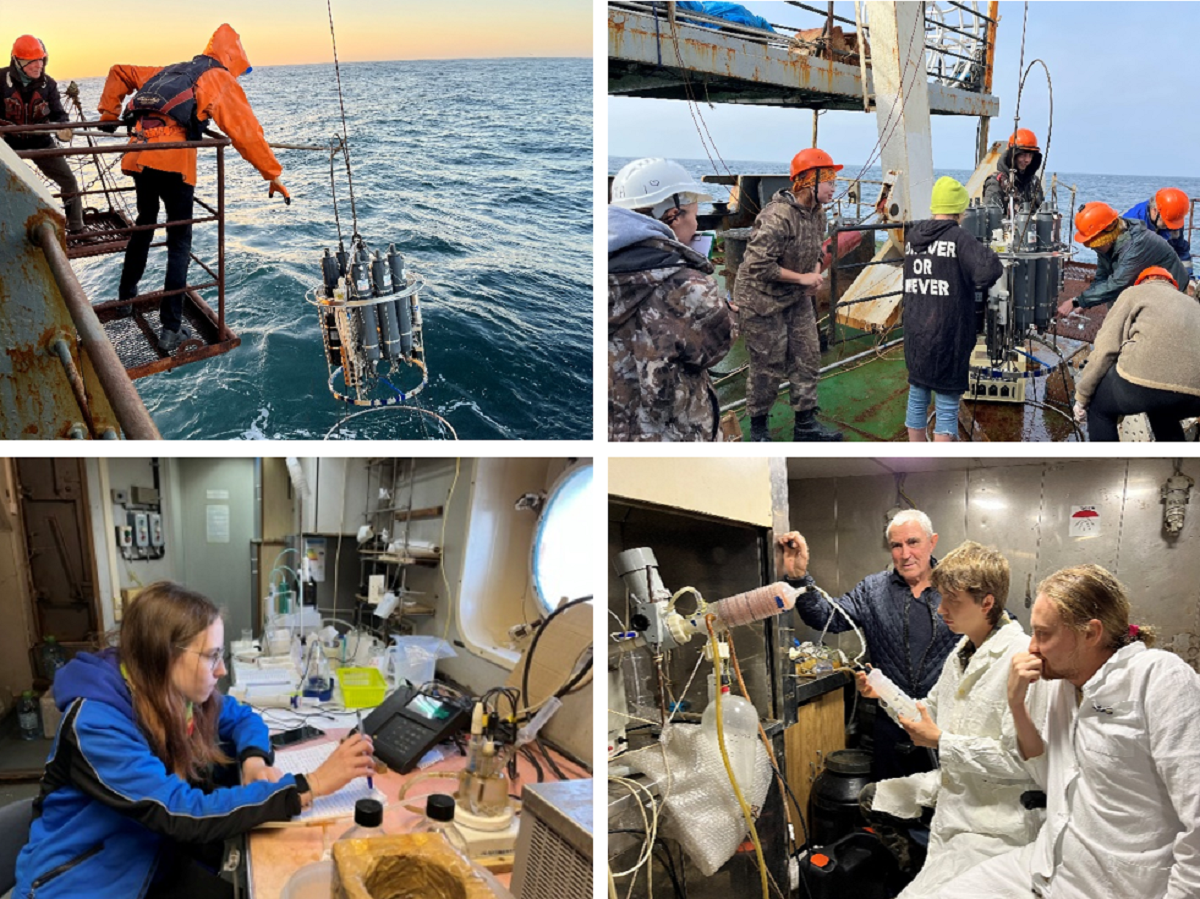
Does the Institute offer topics for student term and graduation projects? If so, could you please share some examples of topics that are currently in demand?
The topics for graduation and term projects can be based on the research findings from expeditions in which the intern directly participates. There are numerous examples of this. In future, these topics can be further developed into PhD theses. For instance, there have been many student and doctoral papers on subjects such as: the carbonate system of the Far Eastern seas; the influence of river runoff on coastal water areas; the dynamics of currents and the formation of mesoscale and synoptic eddies; and the role of these eddies in heat exchange and matter transport. I am referring to academic papers related to expeditions in the fields of physical oceanology and biogeochemistry. Additionally, significant work is also being done in other research areas of the Institute. In recent years, strong ties have been established between POI FEB RAS and the Department of Oceanology at St Petersburg University, particularly in the field of mathematical modelling of ocean dynamics. Several students have done internships in the Nonlinear Dynamical Systems Laboratory, where they engaged in model calculations. This collaboration has resulted in term and graduation projects.
Could you please share your memories of your time studying at the University? What did you learn during those years, and how has the knowledge you acquired helped you in your current work?
Five years of studying at the University is not just about acquiring new knowledge; it is also a significant part of life. We were fortunate to have excellent teachers. During those years, the Department of Oceanology was led by Professor Viktor Buinitsky, a renowned oceanologist and polar researcher. Even as a cadet, during his practical training, he participated in the study of the Arctic seas, developed methods for oceanographic research, and was part of the crew on the steamer "Georgiy Sedov" during its famous ice drift in 1937. In fact, he was initially expelled from the Hydrographic Institute for this, but after the successful completion of the heroic drift, he was reinstated, awarded the Order of Lenin, and a year later appointed Director of the All-Union Arctic Institute. Professor Viktor Buinitsky authored a multi-volume research publication based on the findings from the drift of the "Georgiy Sedov". During World War II, he served in the Baltic and Northern Fleets and was decorated with military orders and medals. These experiences contributed to his independent demeanour and firm, yet intellectual character. Professor Buinitsky wrote numerous research papers on ice in the polar regions of the World Ocean. During those years, the Faculty of Geography was home to many world-class professors whose lectures were highly engaging. Among them were: meteorologist Oleg Drozdov; biogeographer Evgenii Rubilin; and hydrologist Nikolai Razumikhin. Renowned historian Lev Gumilev taught population theory to part-time students. This established the level of teaching.
The Faculty of Geography was then located in a historic building at 3 Smolnaya Street. At the time, the building also housed two other faculties: the Faculty of Applied Mathematics and the Faculty of Law. The rock band "Aquarium", led by Boris Grebenshchikov, who studied at the Faculty of Applied Mathematics, performed at student dances. Meanwhile, in the corridors of the Faculty of Law, one may have encountered the future president of the country, Vladimir Putin.
The Department of Oceanology had a strong academic staff. One of its leaders, Doctor of Geography, Associate Professor and later Honoured Professor of St Petersburg University, Victor Foux taught ocean dynamics. He developed innovative methods for processing and analysing oceanographic data, modelling currents and planetary waves. Professor Foux supervised my graduation project on the dynamics of Rossby waves. After my graduation, we regularly met to discuss topics such as determinism and randomness in ocean dynamics, and the dual nature of wave and eddy motion in water. Candidate of Physics and Mathematics Viktor Rzhonsnitskii specialised in the methods of calculating tidal motions. Under his guidance, I wrote a term project. The heart of the Department was Associate Professor Aleksandra Dmitrieva, who was instrumental in its establishment in 1945.
Internships and practical training in the Department of Oceanology were well-organised. In 1974, after completing my second year at the University, we had a practical training course in the Gulf of Finland aboard the sailing schooner "Leningrad". On the day of the Scarlet Sails celebration, the schooner’s sails were illuminated with red spotlights, actors from Lenfilm came on board, and we sailed along the Neva River, creating a romantic atmosphere for school leavers. Following this, we ventured into the Gulf of Finland where we learned to measure temperature, salinity, and hydrochemical parameters of the water, and practiced to install current gauges. Under the guidance of the Honoured Yachtsman and Great Patriotic War Hero Captain Ivan Matveev, along with our teachers Dmitrii Staritsyn and Aleksei Michurin, we sailed to Vyborg and Tallinn and visited the border island of Gogland. For several days, we stayed at the fort Totleben in Kronstadt, where researchers from the Leningrad Branch of the State Institute of Oceanology conducted measurements of waves and other hydrometeorological parameters as part of engineering surveys for the design of the St Petersburg Flood Prevention Facility.
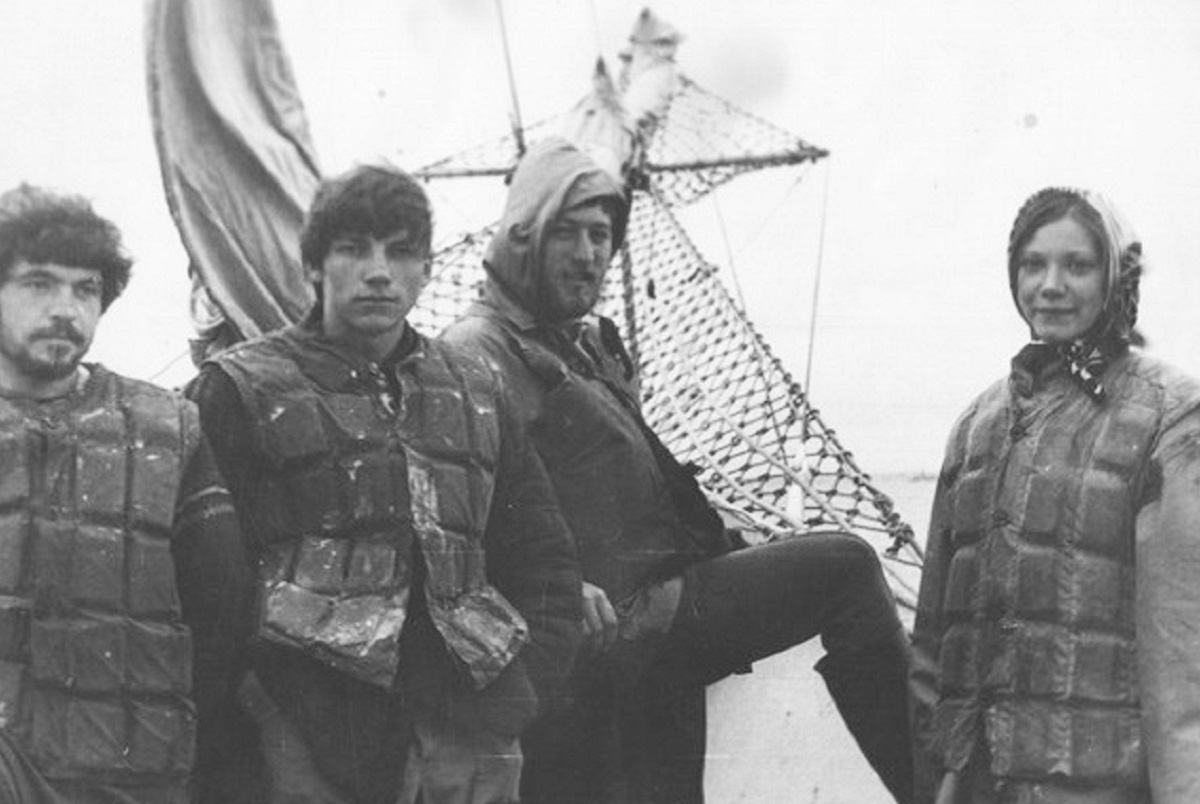
Upon completing their third and fourth years of study, students did internships on research vessels. I participated in expeditions aboard the research vessels "Professor Wiese" and "Professor Zubov", organised by the Arctic and Antarctic Research Institute, in the Norwegian and Greenland Seas as part of the "Polar Experiment — North" programme in 1975 and 1976. I was deeply impressed by the expertise and professionalism of the research engineers. Despite severe storm conditions, they conducted observations with the required quality, demonstrating efficient organisation, competence, and a friendly, well-coordinated team dynamic. This example has stayed with me throughout my life.
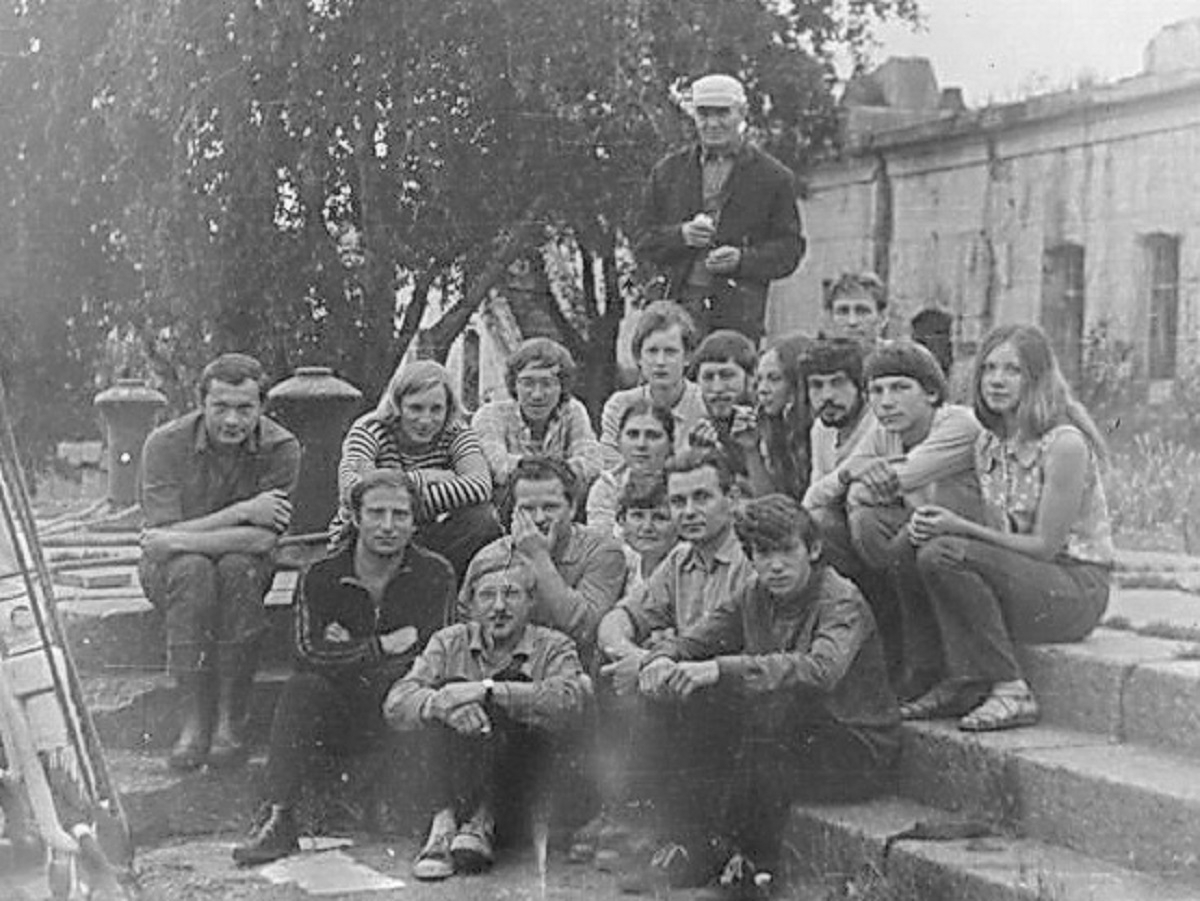
During our studies, we were often told that the University does not simply give you knowledge; instead, it provides the keys to knowledge. This meant that it was challenging to learn and memorise everything from the lectures, but we were equipped with the ability to research and study specific topics within oceanology in depth when needed, while having a solid foundation in the subject in general. This proved to be true. After starting my work at the Il’ichev Pacific Oceanological Institute of the Far Eastern Branch of the Russian Academy of Sciences, I had to read a lot of specialised literature and keep up with new publications in research journals. And this has to be done continuously and systematically.

